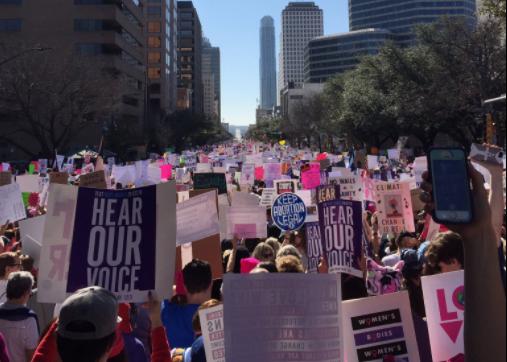Women’s rights supporters flood city streets in solidarity, Colts join the throng

Mimi Schatzman, junior, attended the Women’s March in Austin. She’s not a Trump supporter and she wanted to be “a part of something big”.
Just over a week ago, millions of women worldwide marched in pink crochet hats and solidarity for women’s rights. Plans for marches began popping up across the country the day after the presidential election, with the official Women’s March website criticizing the offensive and demonizing rhetoric spewed during the election cycle. The marches, which originated in Washington D.C., drew out women on every continent who wanted to make their voices heard.
“We started planning to march the day after the election,” Bookkeeper Theresa Zimmerman, who went to the official D.C. march, said. “I felt like our rights are in danger of being taken back 50 years. I’ve always wanted to march in D.C. and this year I have felt stronger than ever to exercise that right!”
The D.C. rally, where the marches originated, brought in over half a million marchers from across the country.
“At first, I was a little nervous, I had never been in a crowd that large,” Zimmerman said. “After a bit, it was very clear that the crowd meant no harm and it was a peaceful gathering. It was an empowering experience.”
In Texas, the Austin rally had an estimated 50,000 protesters, and Dallas, Forth Worth, and Houston had an estimated combined 30,500 marchers. Protests were recorded on every continent, including Antarctica, and for every marcher there was a reason for protest.
“Women’s rights are human rights,” Zimmerman said. “So when people say women’s rights this should also include healthcare, immigration, women’s reproductive rights, equal pay, etc.”
Junior Mimi Schatzman voiced similar sentiments.
“[The marches] weren’t specifically protesting Trump, but that was a big part of it,” Schatzman, who attended the Austin march, said. “I don’t support him and I wanted to be a part of something big and represent equal rights for women, LGBT people, everybody.”
With tensions rising after Trump’s inauguration, many have been vocal about their fears regarding the new administration.
“Seeing as he’s only been in office a couple days and he’s already started to do things I don’t support, I’m worried he’s going to take away rights from people who need them, and deserve them,” Schatzman said.
However, Trump does receive support from many, women included.
“I’m not going to lie, I support Trump and I don’t think he’s going to take our rights away,” Meghan Barnes, senior, said. “I think that what he’s doing has been a battle for a long time and he’s just someone [protesters] can pin it on and say, ‘this is all your fault,’ or ‘he’s trying to take things away from us.’ So I get where they’re coming from, like we want to protect our rights. And that’s great, I want to protect my rights too, but it’s just how they’re doing it and what they’re saying.”
Barnes expressed her concern for the marches over Twitter as they were taking place. She was made aware of the marches after visiting Fort Worth and witnessing one in action.
“I’m not against the marches, but I feel like there’s some things that they’re saying that just doesn’t help us in a way,” Barnes said. “There’s that one thing on Twitter that’s going around saying ‘someday I hope women have as many rights as guns do.’ Everyone’s making fun of them because women have a lot more rights than guns do. They aren’t really helping themselves out.”
Zimmerman felt troubled by the negative responses to the women’s marches.
“I don’t quite understand why anyone, women or men, would not want women to succeed or have the same rights as everyone else,” she said.
An inclusive suggestion came from Schatzman.
“I think that people who opposed the march, especially women and girls who are opposed to it, might not know what it was for,” she said. “I saw a Trump supporter there, and she was there because she wanted equal rights and to be a part of something. I think that they might not know exactly what it was about and what the purpose of it was, and I think if they did some research they may understand it better.”

I am a senior, a third year newspaper staffer, second year editor-in-chief, and perpetually tired. I am an IB student, and have interned with the AISD...
